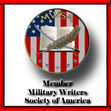|
EXCERPT FROM ABANDONED IN HELL By William Albracht and Marvin J. Wolf By 1940 hours, I decided that if a Spooky gunship was coming, it ought to be within radio range. Big Tex Rogers had volunteered to carry my radio and serve as my RTO. As the artillerymen crowded around in the darkness, I took the handset and called Spooky. No answer. I waited an eternity—maybe two minutes—and called again. No answer. I tried a third time. No answer. Frustrated and angry, I turned to Tex. “This damn radio isn't working!" I hissed into the gloom. Tex swallowed a smile. In his calm, amused Southern drawl, he whispered, "Sir, you need to release the push-to-talk switch." Those tactical radios operate on a single frequency. When I squeezed the handset “talk” button, it disabled the receiver and turned on the transmitter. I looked down at my hand: I held the push-to-talk in a death grip. My transmitter was on, my receiver off. I relaxed my hand, releasing the switch. “All of a sudden the radio goes, ‘This is Spooky 4-1, we’re coming in,’” says LT. Mike Smith. “Everybody got excited—the cavalry was riding to our rescue.” Embarrassed, I managed to mumble thanks to Tex. Again I understand that I was just as frightened as everyone else. Panic is more contagious than the common cold; If we were to have any chance to get out alive, I needed to remain calm and focused. Silently, cloaked by the night, I now made my peace with the Almighty. I resigned myself to the realization that I would not see another sunrise: I could not envision a scenario where this would end well. Not only did I know that I would die, I knew where it would be: As I entered the gap in the jungle leading to Ambush Hill. So I prayed not for my own life, but for the lives of those who had been entrusted to me. And then, unbidden and unexpected, I was filled with a sense of calmness and well-being. It felt like a good night to die. “Alabama” Dykes was again Spooky’s mission commander. It would be a little while before he would be in position to fire for us. I didn’t want to leave anyone behind, so I told the men that I was going to run back to the south end and make sure. Turning to leave, I heard gunfire—small arms—coming from that direction. “The captain said that he was going to run back to the other end,” recalls Nelson Koon. “He said if he’s not back in five minutes, to leave without him. We all said, ‘If you don’t come back, we ain’t going anywhere,’ because we didn’t know the lay of the land like he did. So everybody was shaking hands and whispering, ‘Well if I don’t make it out and you do, get a hold of my parents and let them know what happened here.’” It took only seconds to reach the south end. The shooting had stopped. All our foxholes and fighting positions were empty. As I squatted on my haunches in the darkness, listening, I heard, faint but clear, the unmistakable sound of barbed wire being snipped. And the muffled clatter of sandals moving up the hillside. They were no more than fifty meters down the hill and coming! The hair on my back and neck stood up; I started back for the north end. Then I heard the soft, evil, cough of a nearby mortar firing, and went prone just as the first round exploded a few meters away. Then another blast, a little farther north. A few seconds later, another—the enemy was walking fire south to north along the length of the firebase toward where everyone was massed for evacuation. When the barrage ended, I ran to the north end to find that one man had been killed. Then came a popping sound from high above—a mortar illumination flare. Then another pop, and then another. Kate was naked to any observer on the eastern ridge. Everybody flattened on the hard ground. My heart was a kettle drum, threatening to explode from my chest—I was certain that hundreds of enemy infantry were about to spill over the south crest and come at us, firing. There was no time to lose. When the last flare burned out, I jumped to my feet and announced that we were leaving. But before we took more than a few steps, our point man, in the act of clearing our wire for the main body to pass through, accidentally set off a trip flare. Again, everyone hit the ground. As the shifting, unearthly orange light of the flare floated down on us, we waited for the mortars. None came. That flare seemed to burn forever before it sputtered out. Everyone got back on their feet. For a moment, it was utterly still. Then I heard the welcome sound of the Skyraider diving low toward our hilltop, hoping to make the neighborhood bullies think that he was on a strafing run. But as he barreled over, low and fast, he didn’t fire; I knew that he was almost out of ammo. I expected a Mike Force element to be waiting at the foot of Ambush Hill. I had been told that they would lead us to their main body, a few miles away. To make it easier to enter their perimeter, I put everyone into a single file. I gave the order and we moved out—but after forty or fifty meters, the line stopped. I worked my way to the front and found the point man twenty meters from the gap leading to Ambush Hill. Frozen with fear, he was unable to move forward. Spooky was still too far to fire and clear our path. The enemy was on our heels; I must act immediately. I moved up and took the point. I understood that I was about to die. But it had to be done, and there was no one else. My carbine was slung beneath my right arm and held waist high on full automatic, my finger resting on the trigger. I gripped the radio handset in my left hand. “Follow me," I said, and stepped into the night. © William Albracht and Marvin J. Wolf, 2015 More about the book
0 Comments
|
FROM Marvin J. Wolf
On this page are true stories, magazine articles, excerpts from books and unpublished works, short fiction, and photographs, each offering a glimpse of my life, work and times. Your comments welcome. © Marvin J. Wolf. All rights reserved. Archives
October 2023
Categories
All
|
|
|
Member, Military Writers of America
|
Website © 2016 Marvin J. Wolf. All rights reserved on website design, images and text. ꟾ Updated regularly.
Design by Andesign. |
Professional Reader, NetGalley
|

 RSS Feed
RSS Feed
